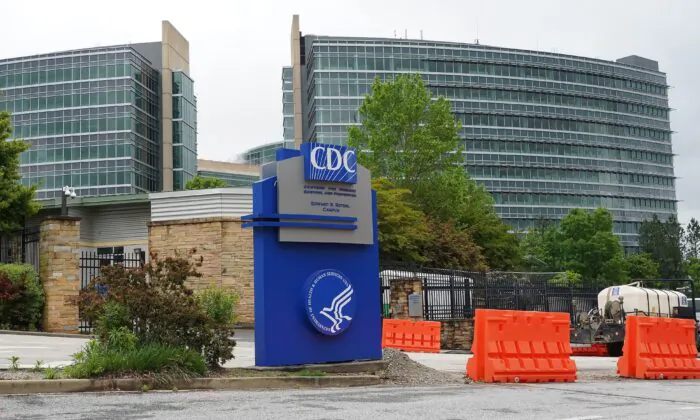All Infected in COVID Outbreak at CDC Conference Were Vaccinated, Agency Confirms

A COVID-19 outbreak unfolded at a conference held by the U.S. Centers for Disease Control and Prevention (CDC) despite most attendees being vaccinated.
About 1,800 CDC staffers and others gathered in April in a hotel in Atlanta, where the CDC is headquartered, for a conference focused on epidemiological investigations and strategies.
On April 27, the last day of the conference, several people notified organizers that they had tested positive for COVID-19. The CDC and the Georgia Department of Public Health worked together to survey attendees to try to figure out how many people had tested positive.
“The goals were to learn more about transmission that occurred and add to our understanding as we transition to the next phase of COVID-19 surveillance and response,” the CDC said in a May 26 statement.
Approximately 80 percent of attendees filled out the survey. Among those, 181 said they tested positive for COVID-19.
Every person who reported testing positive was vaccinated, a CDC spokesperson told The Epoch Times via email.
Nearly all respondents—99.4 percent—to the survey had received at least one COVID-19 vaccine dose. And “there were very few unvaccinated attendees in general,” the spokesperson said.
Officials did not break down the vaccinated between those who had received a dose of the updated bivalent vaccines and those who had not. They were also not able to say how many people among those who tested positive work for the CDC.
“The survey did not ask about place of employment and responses were anonymous, so we are not able to answer this question,” the CDC spokesperson said.
About 360 people did not respond to the survey, so the actual outbreak may have been larger.
Dr. Eric Topol, director of the Scripps Research Translational Institute, said on Twitter that the numbers made the conference a “superspreader event.”
Dr. Tom Inglesby, director of the Bloomberg School of Public Health’s Johns Hopkins Center for Health Security, added that the outbreak shows COVID-19 is “still capable of causing big outbreaks and infecting many.”
A Georgia Department of Public Health spokesperson told The Epoch Times in an email that many people who attended the conference were not residents of Georgia, and that many used tests at home.
There were no mask or vaccine mandates at the conference, though many attendees wore masks anyways, according to the CDC.
Bivalent Protection
The CDC said the survey results “underline the importance of vaccination for protecting individuals against severe illness and death related to COVID-19” because none of the people who said they tested positive reported going to a hospital.
No clinical trial efficacy data are available for the bivalent shots, even though they were first cleared nine months ago. They provide little protection against infection, according to observational data, though officials maintain they protect against severe illness. That protection is short-lived, according to studies, including non-peer-reviewed CDC publications.
The most recent publication, released on May 26, showed poor effectiveness against hospitalization from the Pfizer and Moderna bivalent COVID-19 vaccines, which replaced the old vaccines earlier this year.
Among adults without “documented immunocompromising conditions,” the protection was 62 percent between seven and 59 days but went to 47 percent before plunging to just 24 percent after 120 days.
Among adults with “documented immunocompromising conditions,” the effectiveness peaked at just 41 percent, hitting 13 percent after 120 days.
Researchers did not provide the effectiveness estimates among all adults, or the combined population of those with and without “documented immunocompromising conditions.” They also did not provide the unadjusted vaccine effectiveness (VE) estimates, or estimates before adjusting for certain variables.
“Both the crude VE and adjusted VE should be reported so that big discrepancies are evident to the reader and questioned,” David Wiseman, founder and president of Synechion, told The Epoch Times via email.
Effective against critical illness—defined as admission to intensive care, or death—peaked at 85 among the people deemed immunocompetent, but plunged to 33 percent after 120 days. Among those described as immunocompromised, the effectiveness was not estimated above 53 percent.
Effectiveness was not measured beyond 180 days.
Effectiveness for children was not examined as part of the research.
CDC researchers looked at data from its VISION Network, a network of hospitals in the United States. Exclusions included people under 50 who received four or more old vaccine boosters.
Just 23.5 percent of the immunocompetent and 16.4 percent of the immunocompromised were vaccinated, while the rest had received at least two doses of a COVID-19 vaccine.
About 8 percent of American adults are still unvaccinated, according to CDC data, though that percentage may be a big overestimate (pdf).
Researchers said the data showed that bivalent doses “helped provide protection against COVID-19-associated hospitalization and critical disease” adding that “waning of protection was evidence in some groups.”
Editor’s note: This article has been updated with additional information from the CDC.


No comments:
Post a Comment